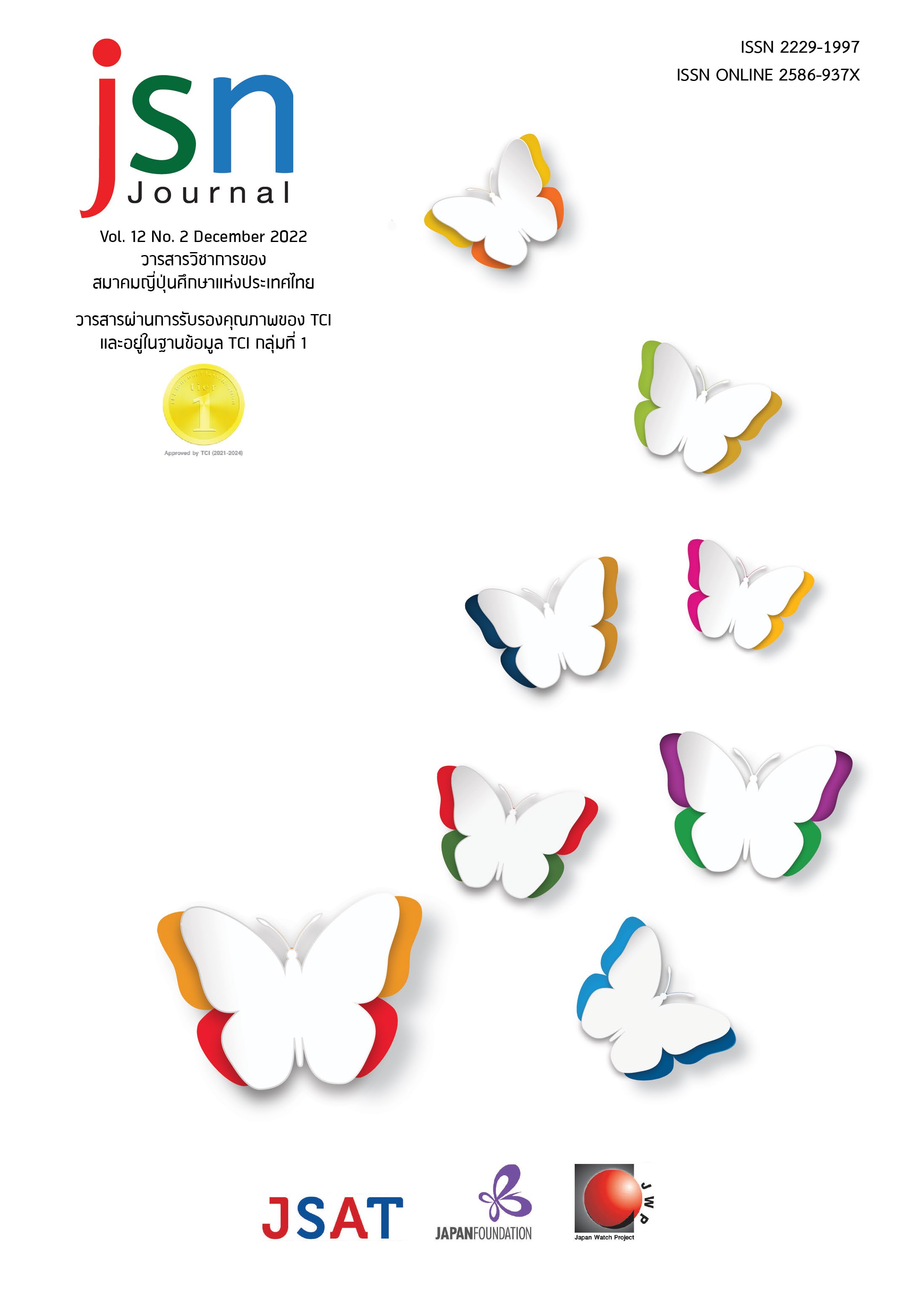Identification of Crucial Pre-Internship Skills A Case Study of Internship Program Involving University Students Majoring in Japanese Language
Main Article Content
Abstract
Compared to those in previous generations, different sets of manpower skills are being sought after by today’s labor market. Academic excellence alone can no longer guarantee success. Recognizing such dynamism, the Japanese Section of ‘A’ University, therefore, initiated an internship program to help students develop life skills and career competencies and, through a certain set of organized activities, to prepare them for the internship per se. In a bid to propose suggested pre-internship student preparation guidelines to the Japanese Section, this study seeks to identify, from an entrepreneurial/corporate perspective, key threats and skills that need to be cultivated by students prior to their embarking on the internship; a survey questionnaire and in-depth interviews were employed as its research tools. The results revealed that the key threats and skills identified from an entrepreneurial/corporate perspective are: 1) eagerness to learn; 2) sense of responsibility; 3) mannerliness; 4) discipline and compliance to organizational rules; 5) work efficiency; 6) communication skills; and 7) teamwork spirit. Moreover, having employed the Importance-Performance Analysis (IPA) framework to analyze students’ internship performance, the study identified the following skills that should stay on top at the Japanese Section’s skill development agenda:1) work efficiency; 2) precision and accuracy; 3) language proficiency; and 4) comprehension ability towards issue at hand. The Japanese Section’s skill development activities should be divided into three categories: (a) compulsory; (b) compulsory elective; and (c) free elective. Threats and skills that are deemed crucial from the entrepreneurial/corporate perspective and are yet to be acquired by students should be developed through compulsory and compulsory elective activities, whereas compulsory elective and free elective activities should be used as a way to nurture career skills and to include students in a decision-making process that determines skill items to be added to the skill development agenda. Such an approach is expected not only to help the Japanese Section align students’ skills in accordance with corporate requirements, but also to allow students to acquire a set of skills that meets their own expectations.
Article Details

This work is licensed under a Creative Commons Attribution-NonCommercial-NoDerivatives 4.0 International License.
ข้อความและข้อคิดเห็นต่างๆ ในบทความเป็นของผู้เขียนบทความนั้นๆ ไม่ใช่ความเห็นของกองบรรณาธิการหรือของวารสาร jsn Journal
References
กมลรัตน์ เทอเนอร์ และจรัสศรี เพ็ชรคง. (2559). ทักษะแห่งศตวรรษที่ 21: สาระสำคัญที่ต้องรู้สำหรับการจัดการศึกษา. วารสารพยาบาลกระทรวงสาธารณสุข ปีที่ 3 ฉบับที่1. 1-15.
ชัยวัฒน์ สุทธิรัตน์. (2552). นวัตกรรมการจัดการเรียนรู้ที่เน้นผู้เรียนเป็นสำคัญ. กรุงเทพฯ: บริษัท แดเน็กซ์ อินเตอร์ คอร์ปอเรชั่น.
ธวัช ทองคำทิพย์. (2564). การประเมินผลโครงการส่งนักศึกษาไปฝึกงานที่ประเทศญี่ปุ่น: กรณีศึกษานักศึกษาวิชาเอกภาษาญี่ปุ่นธุรกิจ มหาวิทยาลัยราชภัฏจันทรเกษม.วารสารญี่ปุ่นศึกษา ปีที่38 ฉบับที่ 1, 56-73.
บุษกร วัฒนบุตร. (2564). ปัจจัยที่มีอิทธิพลต่อการพัฒนา Soft Skills ของเยาวชนไทยในศตวรรษที่ 21. วารสารวิจยวิชาการ ปีที่ 4 ฉบับที่ 1, 87-94.
พชรพล เจริญกิจมงคล.(2557). การวิเคราะห์ความสำคัญ - ผลการปฏิบัติ (IPA) เพื่อประเมินการกลับมาใช้บริการภายในศูนย์การค้าชุมชนย่านใจกลางเมืองกรุงเทพมหานคร (การค้นคว้าอิสระ คณะพาณิชยศาสตร์และการบัญชี) กรุงเทพมหานคร: มหาวิทยาลัยธรรมศาสตร์.
พระราชบัญญัติการอุดมศึกษา พ.ศ.๒๕๖๒ เล่ม ๑๓๖ ตอนที่ ๕๗ ก, ๑ พฤษภาคม ๒๕๖๒ , “หมวด ๑ บททั่วไป”น.3-4.
ภัททิยา จันทรเวช. (2561). การเตรียมความพร้อมนักศึกษาพยาบาลเพื่อลดความเครียดในการฝึกปฏิบัติงานในห้องคลอด. วารสารเกื้อการุณย์ ปีที่25 ฉบับที่ 1, 65-82.
วราลี จัทนโร และ ธนภัส สนธิรักษ์. (2563). การวิเคราะห์ปัญหาด้านการใช้ภาษาญี่ปุ่นที่พบในการฝึกงาน: กรณีศึกษาผู้เรียนวิชาเอกภาษาญี่ปุ่น.วารสารเครือข่ายญี่ปุ่นศึกษา ปีที่10 ฉบับที่ 1, 65-82.
ศิริวรรณ มุนินทรวงศ์. (2561). ปัญหาการฝึกงานและทักษะในการทำงานของนักศึกษาสาขาวิชาภาษาญี่ปุ่น มหาวิทยาลัยธรรมศาสตร์.วารสารเครือข่ายญี่ปุ่นศึกษา ปีที่ 8 ฉบับที่ 3 ฉบับพิเศษ, 206-218.
ศิริวรรณ มุนินทรวงศ์ และทัศนีย์ เมธาพิสิฐ. (2558). ทิศทางการพัฒนาทรัพยากรบุคคลเพื่อ ผู้ประกอบการญี่ปุ่นในไทยในศตวรรษที่ 21.วารสารเครือข่ายญี่ปุ่นศึกษา ปีที่ 5 ฉบับที่ 2, 48-69.
สาคร สุขศรีวงศ์. (2553). การจัดการ: จากมุมมองนักบริหาร. (พิมพ์ครั้งที่ 6). กรุงเทพฯ: บริษัท จี. พี. ไซเบอร์พรินท์ จำกัด.
Nareenoot Damrongchai. (2013). Japanese Speaking Personnel Proficiency Deficiencies: A Case Study of Japanese Education in Thailand. Journal of Language Teaching and Research, Vol.4 No.2, 348-356, March 2013. Academic Publisher.
経済産業省.(2018).「我が国産業における人材力強化に向けた研究会-報告書」.19 กันยายน, 2565, 経済産業省: https://www.meti.go.jp/report/whitepaper/data/pdf/20180319001_1.pdf
前野文康, 勝田千絵, Nida Larpsrisawad (2013). 国際交流基金バンコク文化センター日本語教育紀要第10号(2013年), 67-76.


